Our favourite places to stay on this sleepy Cebu island.
10 Best Things to Do in Sabah for Your 2022 Bucket List
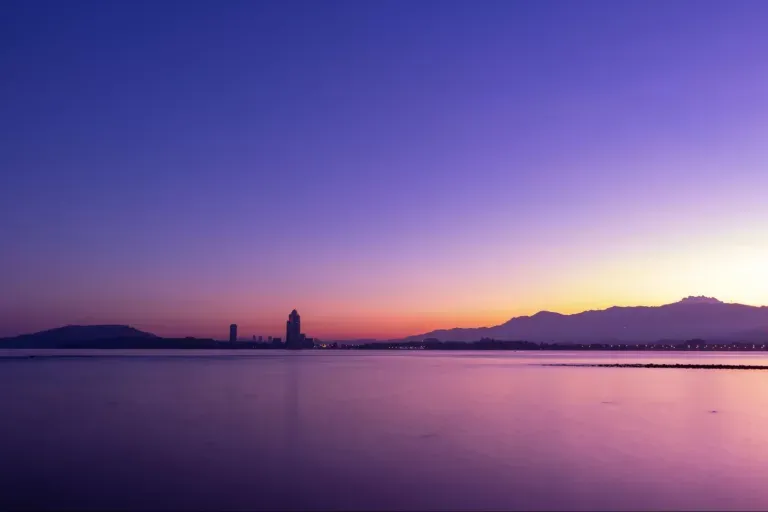
We’re pretty sure you’re already planning your next biyahe with the barkada now that travel is rebooting. Any ideal destinations in mind for a jampacked trip perfect for restarting your international adventures? Pinoy travellers, you can’t go wrong with a trusty Southeast Asian neighbour!
With city centres that showcase unique facets of Malaysia’s ethnic heritage, islands that boast dreamy beaches and the freshest seafood, and verdant terrain marked by rainforests, mountains, and significant biodiversity, Sabah in Borneo presents itself as an underrated travel gem that’s also convenient for Filipinos to explore. In fact, the best may easily make up your 2022 travel bucket list — and visa-free to boot!
|
LOOK: MNL-BKI-MNL fights here! Did you know? AirAsia’s MNL-BKI-MNL routes resume on 27 May 2022, twice a week (every Monday and Friday). Book now and fly worry-free to your next holiday in Sabah, Malaysia. |
Don’t fret if you’ve been to Kota Kinabalu (KK) before; instead, see this to-do checklist as a challenge to experience the best that Sabah has to offer. These are the top , for all types of travellers. What have you ticked off so far?
Exhilarating outdoor adventures: mountain climbing & hiking in Sabah
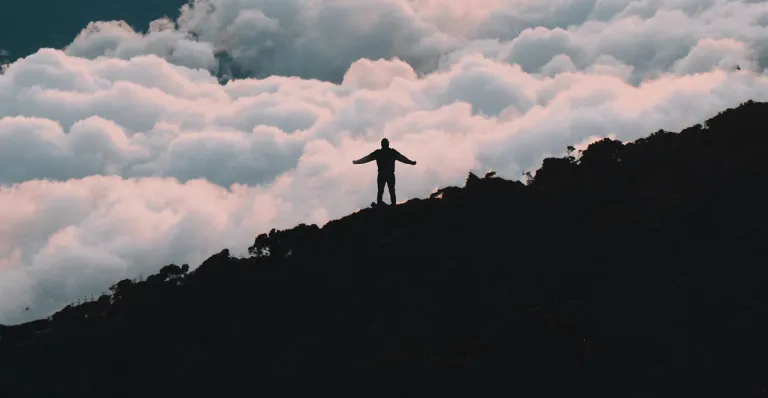
It would feel good to stretch your legs in the company of nature after years of staying at home, don’t you think? Sabah’s mountains are the breath of fresh air we’ve all been pining for, whether you’re overcome by an overwhelming sense of wanderlust or simply an adrenaline junkie in search of their next fix.
1. Climb Malaysia’s top three highest peaks
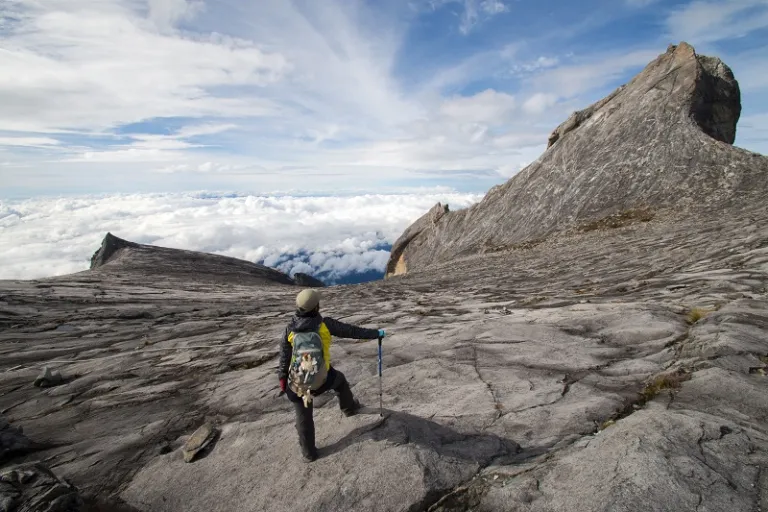 Let’s start your Sabah trip on a high note. And by high, we mean climbing up Malaysia’s top three highest mountains, which can all be found in Sabah.
Let’s start your Sabah trip on a high note. And by high, we mean climbing up Malaysia’s top three highest mountains, which can all be found in Sabah.
Of course, there’s Mt. Kinabalu, perhaps the most iconic peak in these parts of Borneo. At 4,095 metres above sea level (MASL), it’s the highest peak in Malaysia. Now, that’s what we call bucket list material! Currently, there’s a Low’s Peak Summit climb (quite doable even for novice climbers at 2 days and 1 night) that’s open for the rest of the year. They’ve also opened slots for 2023 if you want to secure advance bookings. But be sure to read the protocols Sabah Parks has put in place for everyone’s safety before taking on this once-in-a-lifetime climb.
Summitting Mt. Trus Madi (2,642 MASL) and Mt. Tambuyukon (2,579 MASL), meanwhile, would be among the more underrated — but that doesn’t mean these two peaks are any less interesting. In fact, they say Mt. Trus Madi makes for a more challenging climb compared to Mt. Kinabalu because of steeper ascents and descents, as well as the presence of thick vegetation. Mt. Tambuyukon is no different; avid mountaineers would take around five days to conquer this twin peak.
Choose one or climb all — the choice is yours. But summiting these three gargantuan peaks will definitely be an adventure of a lifetime. There’s no better way to get acquainted with the untouched beauty of Sabah’s rainforests and the species endemic to these ecosystems.
2. Witness glorious Mt. Kinabalu from Magarang Hill
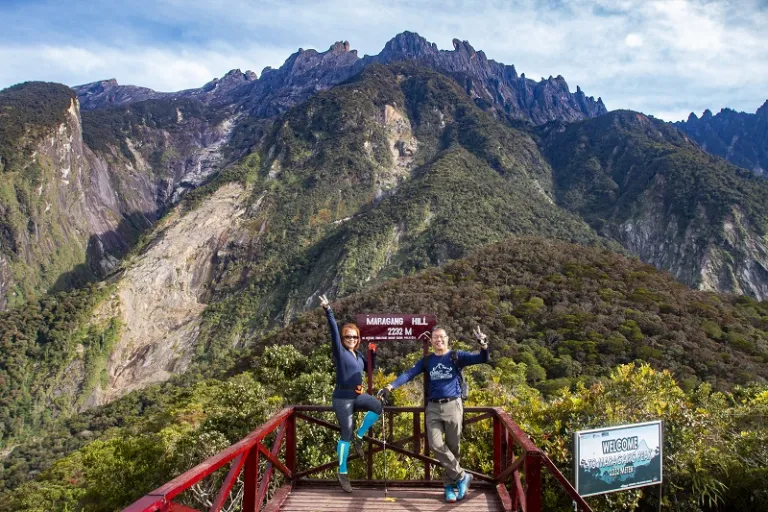
Do you know the saying, “Distance makes the heart grow fonder?” You could say the same thing for Magarang Hill, dubbed the hill nearest to glorious Mt. Kinabalu. For this reason, hiking up Magarang Hill actually gives you more breathtaking views of Mt. Kinabalu from a distance; plus, it offers a less physically strenuous climb. Perfect for beginners and those who prefer not to look haggard in their IG travel photos. *wink*
So how long exactly do you need to summit Magarang Hill? Half a day would be great if you prefer relaxed pacing and leisurely hikes. Those with more active lifestyles, though, can easily climb up the top in an hour. (Think a quick Taal Volcano climb, for Pinoys who’ve explored Batangas province before.)
On average, the climb will take three hours in total, up and down. The rest of the time spent at the peak will be for taking photos, and lots of them. If you’re lucky, you might even spot the elusive Red or Maroon Leaf Monkey — a highland species endemic to Borneo. Not to mention, they’re absolutely cute with their fluffy, orange-reddish fur. If you do see them, admire them from afar and don’t make any sudden movements or loud noises. Remember to respect their habitat.
Idyllic seaside living: islands & beaches in Sabah
From summits, let’s make our way to Sabah’s seas. What’s a Sabah getaway without a taste of its tropical paradises? These are the best things to do on Sabah’s islands and beaches. Ready your reef-safe sunscreen!
3. Book a budget-friendly beach stay at Mari Mari Sepanggar Island
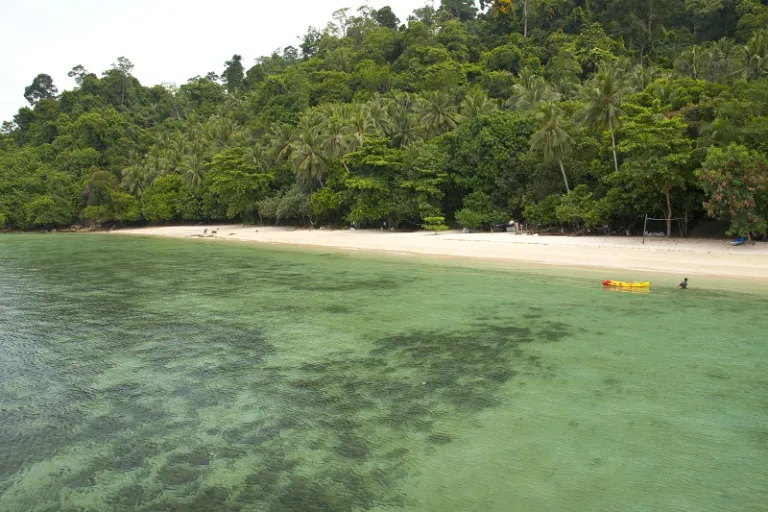 White sand beach? Check. Clear waters perfect for all activities? Check. Rainforests for easy hikes? Check. Accommodations that don’t break the bank? Check! Welcome to Mari Mari Sepanggar Island, an idyllic beach getaway near Kota Kinabalu.
White sand beach? Check. Clear waters perfect for all activities? Check. Rainforests for easy hikes? Check. Accommodations that don’t break the bank? Check! Welcome to Mari Mari Sepanggar Island, an idyllic beach getaway near Kota Kinabalu.
All you have to do is board a 10-minute boat ride from Jesselton Point, the gateway to Tunku Abdul Rahman Marine Park. Once you arrive at Mari Mari Sepanggar, you’ll be spoilt for choice with all the things to do. Watersports and on-water leisure activities such as snorkelling and banana boat riding are available to guests. The island also has a PADI-accredited dive centre where you can learn the basics of scuba diving.
Additionally, the weather stays pretty ideal the entire year, but it would be good to avoid the rainy season if you want more sun during your trip. Accommodations situate you in the heart of Mari Mari Sepanggar Island’s jungle, so this can be the nature retreat you’ve been dreaming of during the lockdown. G na?
4. Indulge in longer island stays at the Mantanani Islands
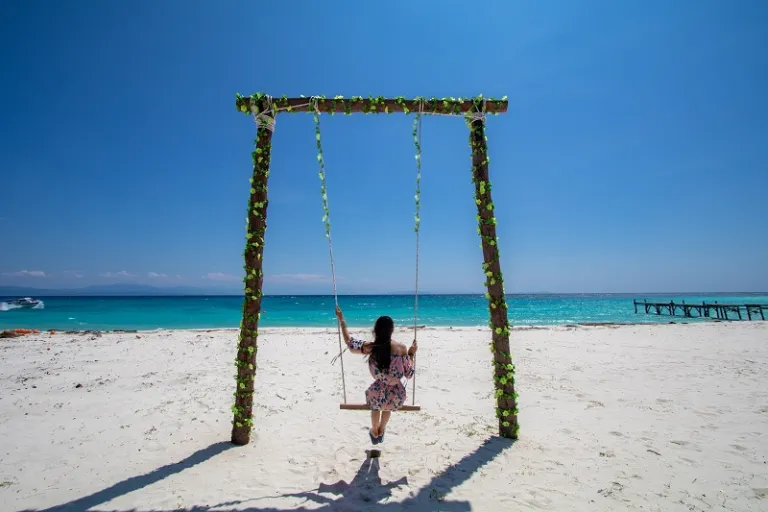 Would you rather splurge a bit during your beach stay in Sabah? Then reserve a spot for the Mantanani Islands on your Sabah itinerary. There are three islands to choose from in this area, and some offer resort accommodations that would keep your vacation fun-filled from start to end.
Would you rather splurge a bit during your beach stay in Sabah? Then reserve a spot for the Mantanani Islands on your Sabah itinerary. There are three islands to choose from in this area, and some offer resort accommodations that would keep your vacation fun-filled from start to end.
Take Sutera at Mantanani Island Resort and Spa in Mantantani Besar, for example. With lots of things to do within the resort premises alone, you’ll never want to leave. Booking accommodations here (choose from beachfront chalets to deluxe rooms surrounded by greenery) is like staying with a community; you’re definitely bound to make friends, locals and travellers alike.
Malaysia’s wild side: up close & personal with nature in Sabah
Sabah is often touted as Malaysia’s ‘last frontier’ mainly because of its lush, virginal state. Here, rainforests thrive amid tourism, and wildlife initiatives offer educational components that allow guests to know the impact of their visit on the animals that call Sabah home. Intrigued? Read on to know more.
5. Explore Sandakan, Sabah’s ‘Nature City’
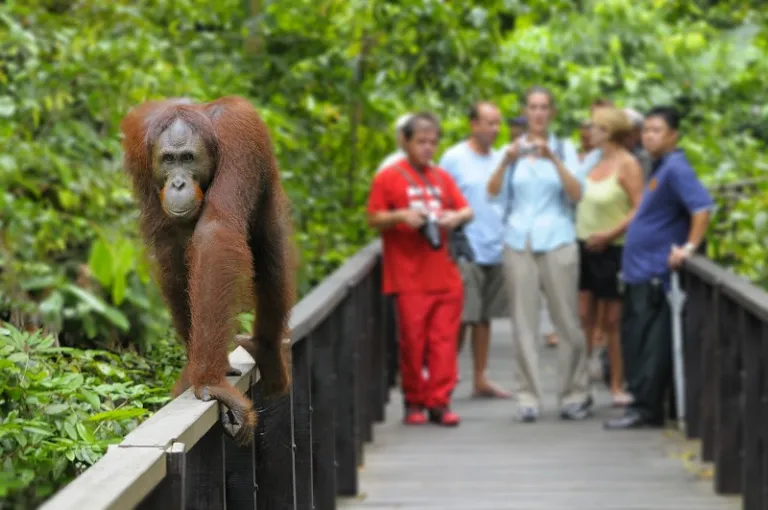 Sure, Sandakan might be one of Sabah’s larger cities, but it sits quite close to some of Sabah’s eco-tourism spots, too. Here, you’ll have many wildlife sanctuaries and environmental centres to visit. Chief among them is Selingan Turtle Island, a known breeding ground for green and hawksbill turtles. There’s also Sepilok, a rehabilitation centre dedicated to orangutans and sun bears.
Sure, Sandakan might be one of Sabah’s larger cities, but it sits quite close to some of Sabah’s eco-tourism spots, too. Here, you’ll have many wildlife sanctuaries and environmental centres to visit. Chief among them is Selingan Turtle Island, a known breeding ground for green and hawksbill turtles. There’s also Sepilok, a rehabilitation centre dedicated to orangutans and sun bears.
Fun fact: Sandakan was once dubbed Sabah’s ‘Little Hong Kong’ because of the Chinese community that settled in the area. It’s also a popular place for enjoying Sabahan seafood.
6. Meet the proboscis monkeys of Labuk Bay
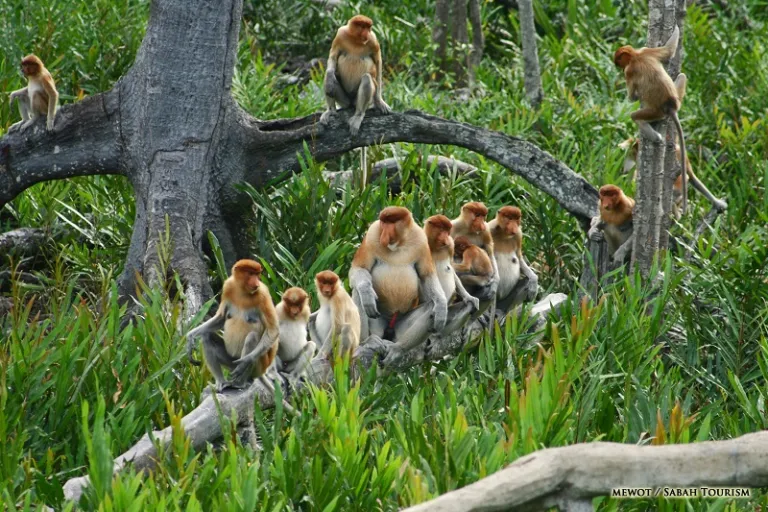 If wildlife encounters are high up on your list of , then you should definitely make time to visit Labuk Bay — a designated sanctuary for proboscis monkeys. From Sandakan, Labuk Bay Proboscis Monkey Sanctuary is about an hour’s drive away, making for a quick and easy road trip if you’re already in Sandakan.
If wildlife encounters are high up on your list of , then you should definitely make time to visit Labuk Bay — a designated sanctuary for proboscis monkeys. From Sandakan, Labuk Bay Proboscis Monkey Sanctuary is about an hour’s drive away, making for a quick and easy road trip if you’re already in Sandakan.
Once at the sanctuary, you’ll meet free-ranging proboscis monkeys who nearly lost their habitat to palm oil production in the mid-’90s. Thankfully, a portion of the mangrove forests was preserved to become a haven for these unique mammals. Learn how the species thrived with the help of tourism-boosted conservation efforts.
7. Visit the Kinabatangan Wildlife Sanctuary
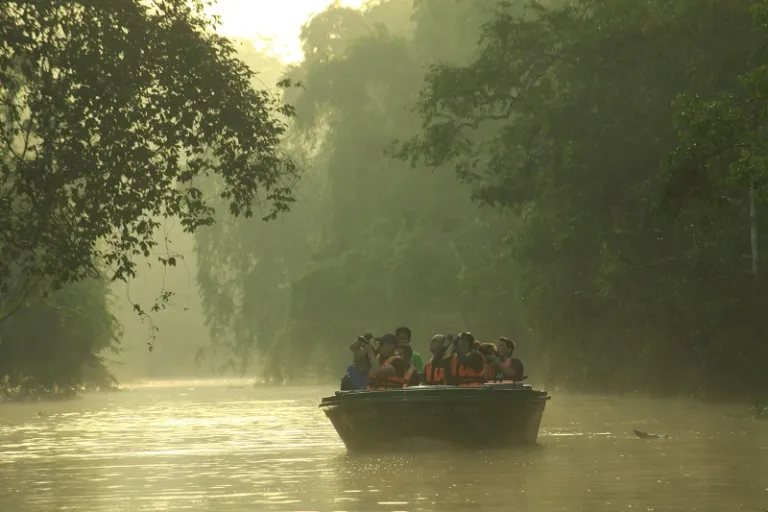 While we’re on the topic of Sabah’s unique wildlife, animal lovers mustn’t miss Kinabatangan Wildlife Sanctuary. Here, you can take a cruise or river safari along the waters of Lower Kinabatangan to get to know its wild residents. This protected ecosystem is home to many animals: elephants, proboscis monkeys, and all eight species of Borneo’s Hornbills! This makes Kinabatangan Wildlife Sanctuary a popular destination for birders, too.
While we’re on the topic of Sabah’s unique wildlife, animal lovers mustn’t miss Kinabatangan Wildlife Sanctuary. Here, you can take a cruise or river safari along the waters of Lower Kinabatangan to get to know its wild residents. This protected ecosystem is home to many animals: elephants, proboscis monkeys, and all eight species of Borneo’s Hornbills! This makes Kinabatangan Wildlife Sanctuary a popular destination for birders, too.
Kinabatangan also houses many cave systems; among them are the sizeable Gomantong Cave and the Agop Batu Tulug Cave, where a key ingredient for yummy bird’s nest soup is sourced.
For a more immersive experience in Kinabatangan, you can sign up for a homestay program that lets you try your hand at farming. It’s the perfect opportunity to try living like a local amid Sabah’s rich natural heritage.
Sabah history & heritage: cultural hotspots in Kota Kinabalu
Speaking of heritage, sabi nga nila, people make the place. What better way to experience Sabah’s diversity than to get to know the people who greatly contribute to this shared heritage? It’s time to make friends in Sabah, the Land Below the Wind!
8. Delve deep into the ethnic heritage of Sabah
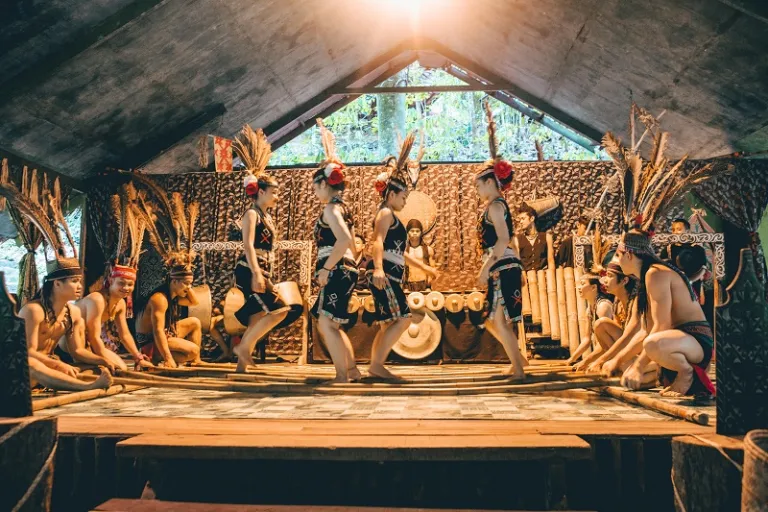
First stop, Mari Mari Cultural Village, where you’ll get acquainted with Malaysian Borneo’s five major tribes: the Dusun, Rungus, Lundayeh, Murut, and Bajau.
According to Mari Mari’s official website, the Dusun and Rungus are Sabah’s resident farmers and traders, while the Lundayeh are known for their excellent hunting and fishing methods. The Muruts, on the other hand, take pride in producing Northeast Borneo’s fiercest warriors, but at Mari Mari, you’re also given a peek into the tribe’s heart and soul. For Pinoys, though, what would be most familiar is the Bajau or Southeast Asia’s sea gypsies.
Step into Mari Mari Cultural Village for an authentic look into Sabahan culture and its peoples’ way of life. Dances, rituals, stories, crafts, and tribal cuisine await! A cultural immersion at Mari Mari also lets you go deeper into the forests of Inanam, which is about 30 minutes away from Kota Kinabalu proper.
9. Feed your faith at Kota Kinabalu City Mosque
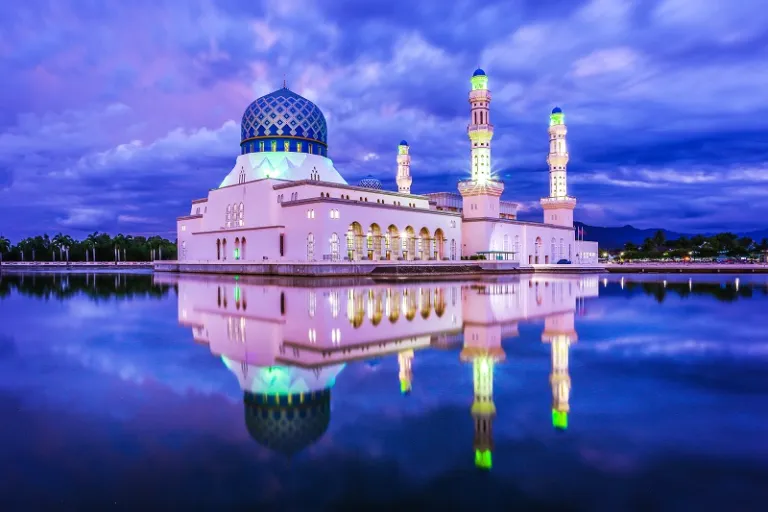 There are many cultural icons in Kota Kinabalu, too, but for a spiritual experience like no other, save some time for the Kota Kinabalu City Mosque. Where do we even begin? Without a doubt, Kota Kinabalu City Mosque boasts beautiful architecture made even more prominent with its white walls and bright blue domes or qubba (in Arabic). What makes the scene even more picturesque is the manmade lagoon that surrounds the structure. While it’s a modern take on the mosque, it’s as solemn as it is refreshing to the eyes.
There are many cultural icons in Kota Kinabalu, too, but for a spiritual experience like no other, save some time for the Kota Kinabalu City Mosque. Where do we even begin? Without a doubt, Kota Kinabalu City Mosque boasts beautiful architecture made even more prominent with its white walls and bright blue domes or qubba (in Arabic). What makes the scene even more picturesque is the manmade lagoon that surrounds the structure. While it’s a modern take on the mosque, it’s as solemn as it is refreshing to the eyes.
Some tips before you visit:
- Dress modestly. No sleeveless and short pieces of clothing.
- Act modestly. No loud or improper behaviour of any kind.
- No food and drinks inside.
- Photography is allowed, but remain respectful all throughout. After all, you’ll be entering a place of worship.
10. Join history-centric tours at Sabah State Museum
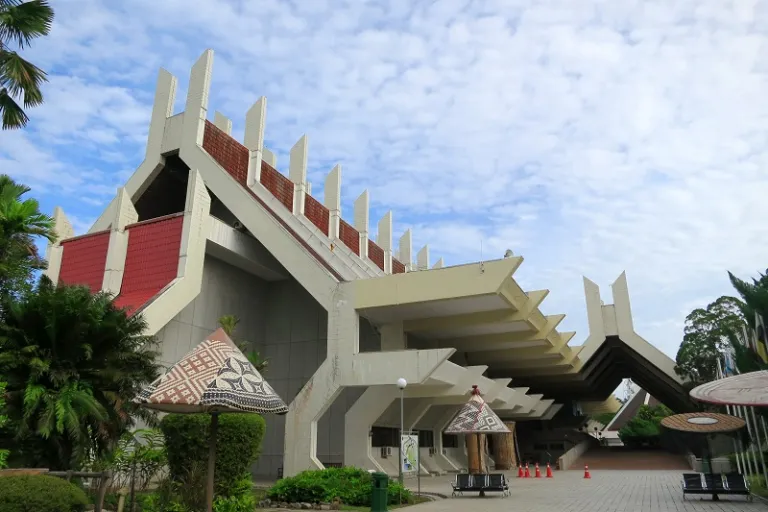 You can’t do a deep dive into heritage without visiting a museum, of course. For that, head to the Sabah State Museum and Heritage Village. While you’ll learn more about Sabah’s ethnic groups here, too, you’ll also find exhibits on natural and state history, archaeology, and trades and crafts of the past. The museum complex also houses a science and education centre, plus a book and handicrafts shop from where you can purchase unique keepsakes to remember your trip.
You can’t do a deep dive into heritage without visiting a museum, of course. For that, head to the Sabah State Museum and Heritage Village. While you’ll learn more about Sabah’s ethnic groups here, too, you’ll also find exhibits on natural and state history, archaeology, and trades and crafts of the past. The museum complex also houses a science and education centre, plus a book and handicrafts shop from where you can purchase unique keepsakes to remember your trip.
Bonus: a genuine taste of Sabah’s seafood
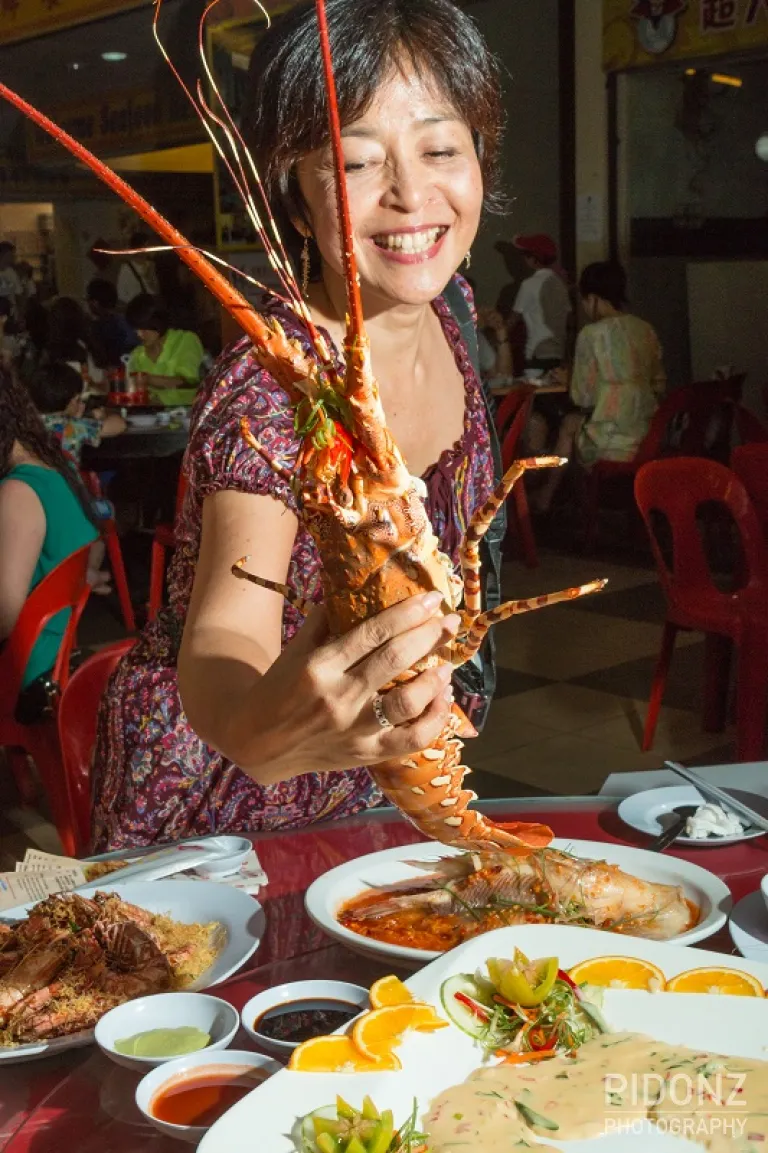
Last but not least, we feast! While in Sabah, seafood is the way to go. This isn’t really just a bonus; it’s a rather integral part of your entire stay in Sabah, and something that you should keep in mind while touring these parts of Borneo. In short, every chance you get, you should definitely chow down on the freshest seafood that Sabah has to offer.
Filipinos LOVE seafood because like Sabah, the Philippines is surrounded by the sea — which means Pinoys are well acquainted with the ocean’s bounty. This also implies that Filipinos are pretty hard to please in the seafood department, but we’re glad to report that Sabah delivers.
You’ll find some familiar seafood specialities like lato (called latok in Sabah), King Prawn, juicy lobsters, and different kinds of fish. The question is, where do you go to taste all this goodness?
Wet markets, night markets, & Welcome Seafood Restaurant
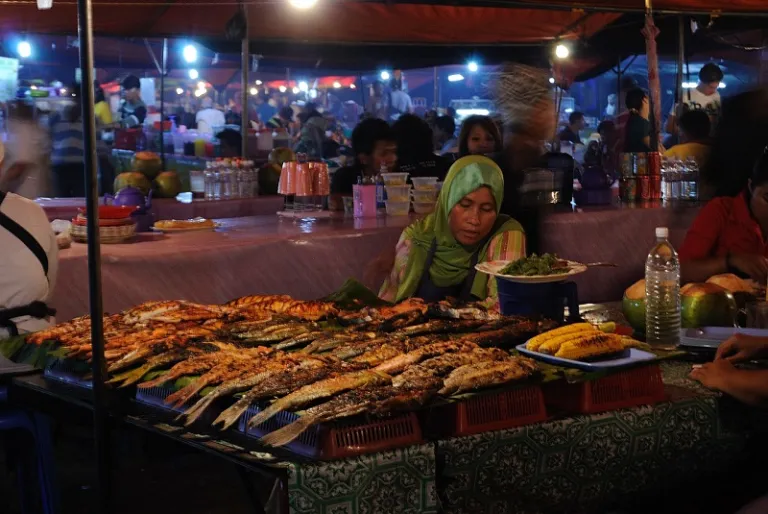 To Pinoys who love food fresh from the palengke or seafood paluto: We recommend dropping by Pasar Besar and the Waterfront Seafood Night Market. Both give off dampa (seafood markets near Philippine ports) vibes, and they offer pretty much the same thing; you can choose your seafood from market vendors and have them cook it in any way you want. Venture out of your comfort zone and ask the cooks to prepare your dish in the most Sabahan way they know!
To Pinoys who love food fresh from the palengke or seafood paluto: We recommend dropping by Pasar Besar and the Waterfront Seafood Night Market. Both give off dampa (seafood markets near Philippine ports) vibes, and they offer pretty much the same thing; you can choose your seafood from market vendors and have them cook it in any way you want. Venture out of your comfort zone and ask the cooks to prepare your dish in the most Sabahan way they know!
Note: It’s best to visit Pasar Besar during the day. Waterfront Seafood Night Market, as its name implies, is best experienced at sundown.
For a friendlier and more commercial alternative (but still as authentic as the first two!), make a beeline for Welcome Seafood Restaurant in Star City Mall. Guaranteed, your seafood stays fresh here because they’re still very much alive and kicking — and actually swimming — in their tanks. There’s a menu to guide you through the dishes, so you don’t have to worry about getting lost in translation. While the markets give you a more interactive approach to enjoying Sabah’s seafood, dining at Welcome Seafood Restaurant is just one of those quintessential things to do when in KK.
Tara na sa Sabah? KK!
 Now, doesn’t that sound like a dream trip jampacked with bucket list-worthy to-dos? Don’t forget, for Pinoys, choosing Malaysia as your next destination also means doing away with all the extra paperwork that visas entail. Tara na sa Sabah!
Now, doesn’t that sound like a dream trip jampacked with bucket list-worthy to-dos? Don’t forget, for Pinoys, choosing Malaysia as your next destination also means doing away with all the extra paperwork that visas entail. Tara na sa Sabah!
Brought to you by Sabah Tourism.
Published at
About Author
Alyosha Robillos
Subscribe our Newsletter
Get our weekly tips and travel news!
Recommended Articles
10 Bantayan Island Resorts, Hotels, and Rentals for Your Tropical Escape 10 Best Mountain Cafes in the Philippines for Your Peak Coffee Experience Coffee date on the mountains, anyone?
10 Commandments for Responsible Travel Flexing Spread the good word!
10 Fairytale Castles In Europe Filipinos Need To See! Permission to feel like royalty even for a day?!
10 Family Outing Ideas in Metro Manila Under ₱500 Looking for a weekend bonding with the family under ₱500? Head to these places, pronto!
Latest Articles
Anko Philippines Store Opens Today – See What’s in Store at Glorietta 2 This holiday season, give your home an upgrade!
LRT-1 Cavite Extension Launches: Five New Stations Open November 16 Get ready for quicker commutes!
China Expands Visa-Free Access: 9 New Countries Added for 2025 Check if your country’s on the list and start planning!
Your Guide to Boyz II Men’s Manila Concert: Tickets, Venue, and More! Get ready for a night of timeless hits!
The U.S. Airlines' New Refund Policy: Everything Travellers Need to Know Talk about hassle free!

